#is entirely a by-product of copyright law
Text
These are just initial thoughts, and perhaps I’ll learn something that changes my mind on it, but I’m glad to see Critical Role making the leap to their own subscription service with Beacon.
As a lead in: I’m an attorney that has some background in IP law, though it isn’t what I practice currently. I’ve kept in contact with several active practitioners, particularly those that represent small-time creators either in their own independent practice or via nonprofits. I do not have an extensive Rolodex of IP peers, nor do I spend the money to keep up on IP CLEs. I’m just someone who used to know a ton because I did heavy research and work in that space, and that hasn’t been the case for years.
So here’s my thoughts a bit on the IP angle:
The primary reason I’m happy to see this leap is that CR is taking active steps to keep control over its IP. It’s a boring thing to most people, but when I start paying attention to a specific creator (authors, directors, companies, etc.), I tend to be very attentive to how they use their IP. How freely do they license their marks to partner with other creators to make merch? How often do they allow others to make adaptations or derivatives of their copyrights? What is the quality of those products? What is the supply chain like? Are those third parties objectionable in some way? Were the other parties faithful to the original works or marks? Was this a cash grab or an earnest effort to make something worth the price tag?
Honestly, I like how CR run their business. They have a history of tapping fans and fellow small businesses when making new merch or spinoffs. They embrace the culture of fan-made derivative works, both by featuring fanart/cosplay and by sharing their success. Do you know how rare it is for a company to pay fan artists for their already-made and freely posted work and then sell books of it? Let me be clear: CR bought a limited license from each artist so they could print and sell each work in a physical book, then paid the cost of publishing that book with no guarantee that CR would make that money back, let alone profit. I have a copy of the collector’s edition art books: they’re actually very well made and the packaging definitely cost a pretty penny. That’s not a rainmaker idea, that’s genuinely risking financial loss to sell something people could access for free if they wanted to.
The art books aren’t a one-off either. Darrington Press is CR’s separate LLC for tabletop games. (It’s good business practice to split off companies that handle products in different industries.) CR has also made shows based on those games, and the Candela Obscura series has quite a dedicated audience. Everything about Candela belongs to them: the game itself, the rule book, all the art in the book, the web series based on the game, and merch. It’s so successful that they invested in scheduling a live show for Candela later this month. That’s HUGE.
Contrast that with the distribution of Campaign 1 and the first 19 episodes of Campaign 2. CR cannot host those videos themselves; Geek & Sundry still exists and still holds what I presume to be distribution rights (but I don’t have the contract to review). So G&S gets to host those videos on YouTube and reaps the advertising. I can’t speak to whatever share CR gets from that, but considering that CR is locked out of hosting their own copies of those videos, I doubt it’s much, if any, revenue. (If you’re wondering why CR just didn’t buy those rights back, I ask: what incentive does G&S have to sell something that’s making them money for no cost?)
Knowing that background about G&S, I was wary of CR choosing Amazon to host and distribute The Legend of Vox Machina. Originally, TLOVM was not the plan; CR had a kickstarter for an animated special based on C1. It was only because they blew past the goal that CR was able to make an entire season. The reasonable assumption is that choosing Amazon had to have secured CR additional funding for future seasons of the show, which seems evident from how quickly season 2 was announced, Mighty Nein Animated is also going to be a thing, and that season 3 of TLVOM is scheduled for fall 2024. CR had the option of just doing 1 season and keeping it purely in their control, but going with Amazon meant they could animate more of their works. Animation is expensive. I cannot stress enough how doubtful I am that CR would have been able to afford this many episodes and both campaigns if they had not gone this route. As wary as I was in the start, it paid off, and it’s going well—so far. Hopefully CR doesn’t regret that decision if Amazon tries something sleazy. But, as before, we don’t have the contracts and can’t know how secure CR’s position is if any dispute came up.
CR also partnered with Dark Horse Comics to make Vox Machina comics and Might Nein Origins comics. What’s especially surprising is that each of the cast had a hand in writing the MNO comics for their characters, with Matt listed for multiple. That isn’t very common with comic adaptations. Often times, IP owners let comic companies go ham with minimal oversight. Being listed as one of the authors comes with IP rights that have to be negotiated. That means that Dark Horse had to talk with CR about whether that warrants more or less revenue going to which party in exchange for that—or, alternatively, whether the comic gets made at all. That’s a ballsy move. You think people can just demand to write the comics that a publishing company is going to pay to print? Pffft. CR wanted some creative control, and that is a big ask. However, Dark Horse still has the distribution rights, both digitally and for physical copies. You couldn’t buy the comics from CR until they came out with the library edition, a book bound compilation of 4/8 comics. But the publisher is still Dark Horse; CR is just allowed to sell the book directly from their own site as well.
Contrast that with the novels about CR characters. CR partnered with Penguin Random House to publish novels about Vex and Vax (Kith & Kin), Lucien (The Nine Eyes of Lucien), and Laudna (What Doesn’t Break). Liam and Laura were vocal about having some say in K&K, whereas Madeline Roux said in an interview that she had full control over TNEOL. Both of those novels were narrated with CR voices, but narrating a book doesn’t come with IP rights, it just brings in a paycheck. There’s a lot less IP control in there compared to the comics, but this isn’t abnormal for book publishing. To be blunt, I doubt PRH would have agreed to publish the novels if anyone from CR had been a co-author or had heavy oversight over the author or the editing. I don’t think PRH even considered that as an option. Either an author that has already managed to sell X number of copies or nothing. Creative control over a book a huge ask, asks come with reduced revenue, and switching to books from a web series is already a leap. The fact that Laura and Liam had any say is surprising, really.
That was a long meandering tour of what we’ve seen CR do with its IP. The reason I bring up each of these things is that navigating the way to protect an IP in this space is rife with challenges. Different types of IP warrant different strategies because of the cost involved in creating each medium and the challenges placed by industries that have already sprung up around them. Any time that a third party is tapped to create an IP, it’s usually because they already have the funds and resources to create the work, and CR has to negotiate for revenue, creative control, distribution, and—the big one—who gets to be the owner. These are not easy, quick, or fun conversations, and CR is always going to be the smaller company at the table.
Knowing that, I’m not surprised or worried that CR is creating its own independent subscription service with Beacon. It tells me that they’re being careful with their IP whenever they can. A subscription service means they don’t have to trade away distribution rights or give up ad revenue to a third party. They’re in this for a long term investment, and that requires solid income not tied to third parties that can definitely outspend them in litigation in the event of a dispute. A subscription for bonus content is one of many parts in a diverse revenue stream.
(All that said, this isn’t meant to criticize creators that cant afford to do this type of thing. It took 9 years for CR to get to the point where Beacon is financially feasible and a desirable business decision. They have enough ongoing, popular content to warrant paying for a subscription, and they’ve built sufficient trust with their audience that more will be added. That takes time and an awful lot of money.)
As a final note, I take this step as a sign that CR definitely intends to stick around. This isn’t a move people make when they plan on ending the business after the current campaign. I’m glad to see CR is taking steps to secure their foundation and keep making new content.
I’m sure people will chime in on other issues (cost, content exclusivity, etc.), but I hope my perspective gives an idea of why this sort of thing is good for business generally and why it would be good for CR.
#critical role#beacon.tv#don’t trust me I’m a lawyer#I’m not your lawyer#I’m not CR’s lawyer#none of you paid me for shit#I do what I want
176 notes
·
View notes
Text
Do you ever think about how if we lived in a time before copyright law, all of those masterful fanfics on ao3 would be part of an expansive, beautiful example of human storytelling much like oral-storytelling and the stories and myths of old like arthuriana and the greek myths, told in many ways with many versions and with many themes with different messages for different people? and how that would be beautiful and a testament to human creativity and a sacred part of our literary history.
do you ever get a little bit sad that we live in a time of copyright law, where much discussion of stories argues over what is ‘canon’ and ‘not-canon’ and how the distinction between those two is largely based on whether or not the story was created for profit, and how much profit it was created for
yes, yes, artists deserve to be able to make a living and get paid for their efforts and we ought to support them, and there are only so many ways we can do that in the confines of our current societal structure
but do you ever wonder how the way we tell each other stories, and the way we talk about and share those stories, would change, we did not rank whether or not a story is meaningful by whether or not it was produced for-profit
#fanfiction#fanworks#the distinction we make between a fan-made work#and the telling of a story professionally#is entirely a by-product of copyright law#thats what im saying#you can harp on about origionality sure#but why is BBC Sherlock or BBC Merlin or doctor who in its 60th year telling the story of a regeneration for the 14th time#count as a profession story when none is original?#originality can be expressed in the reinterpretation of an old idea is what im saying#and no story is truly origional or independent of other literature#its not about origionality really#the only reason origionality becomes a factor at all is for copyright purposes#i wonder what stories will look like without copyright law#anyway isnt the public domain awesome
5 notes
·
View notes
Note
OMG! I can practically see her pulling at her pearls in indignation and fury! I wonder how many wet dreams he rejected her to result in this anger 🙃🙄😜
https://www.tumblr.com/maximumwobblerbanditdonut/747779411400671232/public-intoxication-sh-was-invited-to-the-landcon?source=share
Dear Pearl Clutching Anon,
This woman is the worst mythomaniac and the most pathetic know-it-all of the entire fandom. Mark me: probably a sock account of one of the Mordor sopranos, who'd like to play it cool otherwise. She is an impostor, pretending to be a Scot. But her grammar and spelling recurrent mistakes point to anything else but an English native speaker.
Prized and praised as she is by the dim-witted, she is living proof of the fact that you cannot reasonably and endlessly pretend to be an expert in hair implants, cocktails/bartending, audiovisual production, copyright, alcohol sales and pretty much everything in between. To me, she is at her most pathetic when she pretends to analyze the legal intricacies of the French regulations applicable to public alcohol tasting events.
What happened, in fact, at the Landcon 6 whisky tasting?
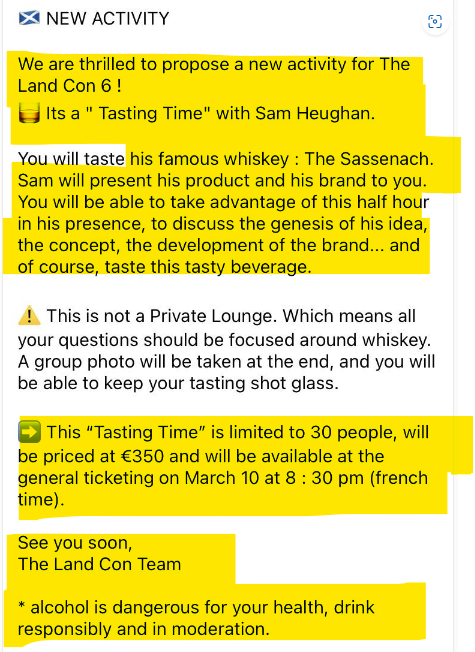
Ok. So, this was announced by the French organizers on March 5th and presented as a limited audience event, priced at 350 euros.
This idiot's comment is absolutely priceless:
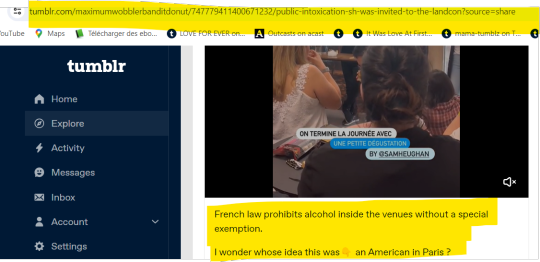
She would be surprised to find out that, unlike the US, there has never been any Prohibition decreed in France (Hell would have frozen). Even more interestingly, the only venues where French law specifically prohibits alcohol tastings and sales are enumerated very clearly in regulations far above her intellectual abilities:
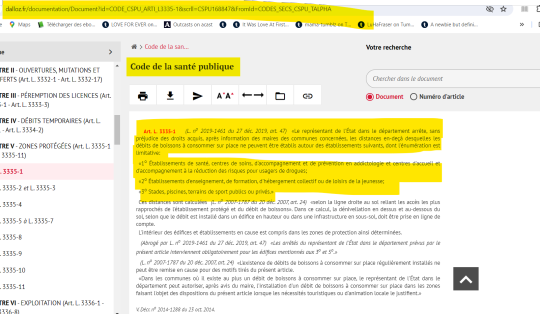
The main idea is that you cannot sell/organize alcohol tastings in public health venues (hospitals, clinics, etc), rehabilitation clinics (d'oh!) - both for alcohol and drug addictions -, schools, youth summer camps, sports arenas, swimming pools or any other public or private sports venues.
(Source: French Public Health Code, https://www.dalloz.fr/documentation/Document?id=CODE_CSPU_ARTI_D3335-1&scrll=CSPU022225&FromId=CODES_SECS_CSPU_TALPHA)
To these limitations, the French national professional organizations add, as best practice, the following: churches, cemeteries, prisons, military barracks, railway/public transport facilities (including depots).

(Source: Vin & Société's Guide juridique de la dégustation/Tasting Legal Guide - https://www.syndicat-cotesdurhone.com/upload/article/file/202103guidejuridiquedeladegustation-60658bb9468b4.pdf)
To my knowledge, Landcon's venue was neither a cemetery, nor a church (the latter could be, however discussed: wee & lame joke, btw). And for that poor woman's information, you would not need an exemption, but a permit, or licence. In current French law, there are four such sale permits, ranked from I (soft drinks, such as Orangina) to IV (all drinks, including spirits). The fabled Licence IV (also the name of a beloved 90s French kitschy music group, LOL) is now impossible to obtain and if you want to have one, you have to buy the venue (cafe, nightclub, bar, bistro, restaurant or buvette) that had it issued first, many moons ago.
That problem solved, we would have to further analyze the type of event hosted by the Landcon. Was it a tasting or a sale, according to French regulations?
If it was a tasting, no licence is needed. If it was a sale, you might need a temporary licence, granted by the Mayor, provided you have notified them at least 3 months before the event. These are also famously hard to get and very sparingly granted, too.
Because tastings are an exception, they are strictly defined by French regulations as 'free alcohol consumption' and their regulations are excruciatingly detailed. Procedures and limitations vary according to the type of event: sports, tourism promotion, markets and fairs, public gatherings or cultural events (which is the one that seemed the closest to our situation). But a cultural event-cum-tasting would have to be completely free of charge (no paying access tickets), in order to be exempt from any legal obligation. This was not the case, as we know there was a rather steep, 350 euros fee, to be able to attend it:
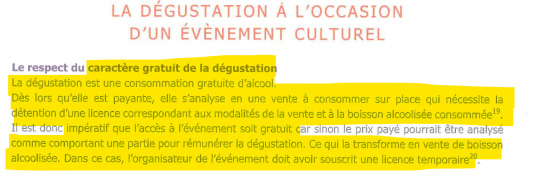
(Source: Vin & Société's Guide juridique de la dégustation/Tasting Legal Guide - https://www.syndicat-cotesdurhone.com/upload/article/file/202103guidejuridiquedeladegustation-60658bb9468b4.pdf)
That new activity was certainly not a tasting, as defined by French law. An amateur could then conclude, that S's event was, in fact, a disguised sale and that he is either a sinister fool or a filthy conman.
The trouble is, French legislation tolerates one single, overruling exception to everything I wrote above: sale by the producer of said alcohol. It is to be found (or rather interpreted - and it has been so by myself AND the French professional organizations), in the Code Général des Impôts/ French Tax Code:
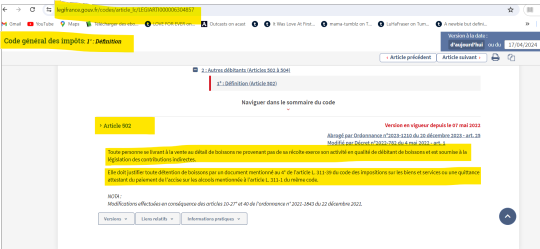
To avoid a tedious legal translation, the idea is that if you do not sell your own produced booze, you are automatically considered as a stockist/trader and as such, subject to alcohol sales' regulations. If the Landcon organizers would have sold/promoted Laphroaig, for example, they would have needed the permit. But hosting a paying tasting event organized by SRH, promoting SRH's whisky and which profits entirely belonged to SRH is a sale by the producer, as defined by French law, not needing a permit:
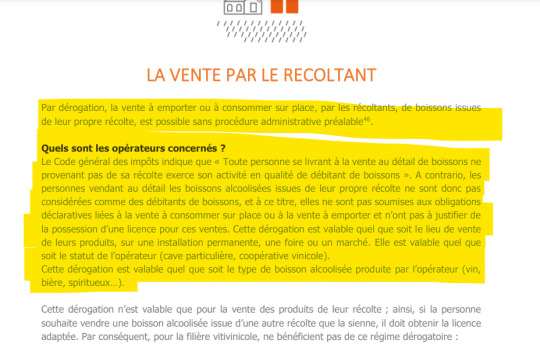
(Source: Vin & Société's Guide juridique de la vente/Sales Legal Guide - https://fgvb.fr/wp-content/uploads/2021/04/Vin-et-Societe-Guide-juridique-de-la-vente-19042021.pdf)
So: even if the tasting event was, in fact, a sale, French law allows a producer to sell his own alcohol, for promotion purposes as a side event, with no further need to obtain a permit. And this is exactly what their legal team rightfully advised them to do and completely what I would advised them to do, too.
That woman is so often and in so many ways completely wrong, that she is absolutely ridiculous. She (and also her other Big Friend) should perhaps stop pretending to be whatever they are not. Infantilizing, bullying and snarling at people does not help with their credibility.
Such women are genuine Frauds and absolutely despicable. People spend years fucking their eyesight in law school and we do not joke about interpreting and reading legalese. Ever. But to see idiots pretending to know just because they fucking used Google for ten minutes is just infuriating: it took me two hours to find the exception and another two to write this comment.
I hope this long, tedious answer was helpful, Anon.
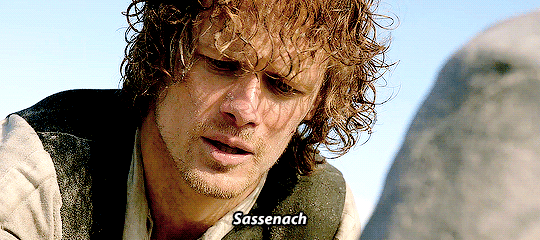
78 notes
·
View notes
Text
No one has a right to destroy art.
Not even the people that "own" it. Because we don't own the art we make. We own a temporary patent on that work. Culture belongs to everyone, and the only reason IP exists is to encourage the production of cultural artifacts by making it a viable income stream.
So when it comes to things like the Batgirl movie, or Coyote Vs ACME, or the Micronauts cartoon, or the Capcom Alien Vs Predator beat-em-up, or any other piece of media that is destroyed or made unavailable due to rights issues or because it's being sacrificed for a tax break, there should be protections for that work.
Either a national database must be maintained to hold those works until their public domain dates are reached (a project that would at this point span a century) or, a much simpler correction should be applied.
If the law says it can't be made available for profit, it becomes public domain.
You write off your movie as a tax break? Fine, that movie is available for anyone to enjoy, remix or alter for free.
You can't work out a deal between the film company and the game company to keep the classic video game available? You're both willing to chop the baby in half rather than let the other one have it? King Solomon says the baby belongs to everyone.
And to close the loophole for companies employing more than X number of people, if you can't buy it, or stream it, then you can't enforce copyright on it. There's no excuse for any major media company not to have its entire catalog available to the public at least as a burned-DVD-on-request system.
These companies want to sit on piles of culture like dragons and reap the rewards. In the case of the oldest and largest, in many cases they claim ownership over what can only be called our modern folklore. The idea that a company can own Batman should be as insane as the idea of a company owning Hercules, Paul Bunyan or the Archangel Michael.
But if that isn't going to be insane, if we're going to give that kind of power to corporations, that power should come with responsibilities.
88 notes
·
View notes
Note
Idk man I feel like its not really in the spirit of communism or good humanity in general for an overwhelming majority of artists to say "I don't want my work used in this way, and this type of technology unchecked has a track record of harming other communities while simultaneously producing a lower quality output and having a negative effect on the whole industry and allowing big corporations to further exploit us" and then for you to say "it's not technically stealing and also you shouldn't HAVE to rely on this art for your income because capitalism is bad anyways." Let me tell you, a transformative work by a human being is genuinely transformative, took time effort and creativity and ultimately pays homage to the original artist. That may be the law that these AIs are operating under but it is NOT the same and people have a right to be upset. You're getting an unfollow for this one and maybe you should learn to listen to communities better when they speak out for themselves.
i mean this in a very literal sense and not as an insult: you and everyone who agrees with you are modern-day Luddites. Luddites saw the advent of automation during the Industrial Revolution as a threat to the necessity of human workers and responded by destroying machines in cotton and wool mills.
the Luddites arguably had a point - automation did reduce the number of workers that mills (and all other factories) needed to run, and the existence of automation pushed those remaining workers to work even harder to increase productivity.
the Luddites also famously lost. workplace automation is still everywhere and growing . it's literally my job, in fact.
i understand that this entire development sucks for artists working off commission, but there really isn't any way to stop this from happening now that the genie is out of the bottle. that isn't how technology works. you can get mad at the people using AI to rip off/undercut specific artists, but that's about it. anything beyond getting mad is either fighting market forces wildly beyond your or anyone else's control, or advocating for increased copyright/IP law, which, like, you don't want that, please, for the love God do not let AI art trick you into thinking IP law is a good thing
221 notes
·
View notes
Text
like. i still wouldn't want someone to copy and paste my fics into a large language model like chatgpt but it's not so much bc i'm worried abt my work being stolen (seems unlikely that an LLM would spit back out my exact words considering how it works, and even if it did, i doubt any individual would be able to like. publish and profit from those words, based on the nebulous status of copyright law when it comes to LLMs like chatgpt. and having my words fed into the LLM really isn't going to make much of a difference when it comes to corporations profiting off the tool in the first place; plus in instances of corporate exploitation i think there are more effective ways to organize than like...arguing for strengthened ip laws or trying to like make ip laws for fanfiction spaces). it's more because i'm wary of what that says about how a person is like...approaching my fic specifically + fanfiction more broadly. in two main ways:
1. i think it is just. basic respect to check with a writer before u take their work off ao3(or whatever fanfic-specific place it's been shared) and put it somewhere else. and like, this applies to lots of things outside chatgpt--reposting fics to other sites, posting them on goodreads/storygraph, printing + binding fics, etc. if u are treating fanfic writers as people who u are in community with, who are generously sharing a gift with u, then it seems like basic kindness to check in and see if they're alright with u taking that fic outside the space it was posted to do something else with it.
with chatgpt and similar LLMs specifically, a lot of people are wary because there's still so much unsettled in regards to how copyright laws might shake out, and most people (myself included) are unsure of how/whether our writing/data might be stored and used by these corporations that own the LLMs. i don't think ai itself is something that should be mythologized as like ontologically evil technology, but anytime a corporation is introducing us to new tech like this we need to be wary of where it's coming from and how it could be used--people have already pointed out a lot of very serious issues with the way this technology is being developed and how it could/likely will be/already is being used exploitatively--which, again, is more a matter of organizing against corporations than railing against ai tech itself, but is still a valid reason for writers (again, myself included) to be wary of having their work fed to LLMs without permission.
and like. sure, u don't have to care abt writers' feelings + boundaries and can just take their stories and do whatever u want with them. but to me that says u aren't treating fanfic as a community space, but rather a content farm in which fics are products that u are entitled to do whatever u want with. and i just think that's shitty! and if that's how ur treating fanfic then i'd rather not have u reading my fic at all
2. i honestly think it's a strange way to engage w storytelling by treating endings this way. like. story endings are usually v important + intentional, and can completely change the entire tone, themes, messages, etc of a story. i understand going to the writer and asking them abt what they had in mind for the story ending if ur looking for closure, and i understand imagining ur own story ending or even writing ur own ending to an unfinished story. what i don't understand is plugging a story into chatgpt and having it spit an ending out for u.
and like. maybe this is bc we've all been calling these LLMs ai, which evokes an impression of like. a sentient robot creating something. but that's not what these programs do! the first article i linked explains how they actually work really well, but essentially--chatgpt and similar LLMs cannot create new ideas. they can't take a story and synthesize its themes or pick apart its tone to then come up with an original idea for an ending. at the same time, they aren't just plagiarism machines that are ripping text directly from other writers and spitting it back out.
instead (to my understanding), what they're doing is compressing vast amounts of information by running statisical analyses to just save the most common trends, patterns, recurring info, etc, and then plugging that in to fill the gaps. it looks like it's writing something new, but it's essentially just paraphrasing already-existing information pulled from the internet. so i'd imagine that if u fed an ai a fic and said "write an ending," the ai would basically compare the fic to whatever similar stories it has saved and then spit out an ending that is most commonly found on the internet for that type of story. [not an expert here tho--this is just my best guess based on the bit of research i've done].
my point is--you won't be getting a new ending inspired directly by the story u put in. you'll be getting a paraphrased version of the most commonly recurring type of ending for similar stories on the web. and i just....don't see how that would be satisfying in any way. it seems, again, like a way in which someone would be approaching fic like a product, something that needs to be finished + complete bc ur entitled to it, rather than viewing fic as a piece of art with its own unique themes, message, and story that can't just be plugged into a one-size-fits-most ending generator. and like, i'm trying to avoid mysticizing writing as some sort of ethereal art form that would be blasphemously degraded by having someone plug in a shitty ending paraphrased from a conglomeration of various similar stories--i don't think someone creating a shitty ending for a story is like. a horrible evil thing. but i can understand where the satisfaction is coming from if you're writing your own shitty ending, where you get to come up with where u think the story would go + where u get to synthesize the themes u picked up on etc. but ai isn't even doing that--so again, i don't understand where the satisfaction is coming from aside from just going "well every story i read needs to be finished," which. makes me wary bc it just feels like a completely different way to approach stories and storytelling than i would hope to find in fanfic spaces, one that treats fic less as a creative place to explore and more as a transactional space where u are entitled to products.
anyway. feel like my thoughts + feelings abt ai keep changing the more i learn abt it + i'm sure they could change again, but rn my impression of this whole situation is like. i find the fact that some people are plugging fics into LLMs less concerning re: ip + ownership rights, and i don't think it's useful to exaggerate or mythologize abt what ai actually does (i think even calling it ai has kind of misled a lot of people, myself included). what concerns me more is that plugging fics into LLMs to write endings feels symptomatic of a broader culture in which people treat fanfic as an informal profit economy in which fics are product or content that a consumer-audience is entitled to, and i think that sort of approach leads to a whole plethora of other issues + makes fandom a more hostile space.
#hopefully this makes. sense#i am not a fan of most of the uses of ai/LLMs that i've seen#but i also am concerned that much of the backlash against it seems to be defaulting to this position of either#mysticizing writing in reactionary ways#and/or running into the arms of ip laws#which are a tool of capitalism and shouldn't be trusted any more than the corporations who profit from + exploit them!!#definitely feel like there are issues w plugging fics into LLMs without permission and would not want anyone to do that w my writing#but. moreso bc i don't want my writing being treated like content for consumption y’know#anyway the articles i linked esp the first and third r really good...highly encourage reading them#ranting and raving#txt
73 notes
·
View notes
Text
imo the recent wave of "ai art is valid actually" discourse often misses the point of the reaction against ai art. And I think the reaction is often reacting against the wrong thing too.
The end product is not the problem. Like it or not, AI generated art is now a valid subset of art. It makes something that wasn't there before, usually has some purpose or intent in the process, and it makes people feel something. Hating it is still something.
El problema, como siempre, es el capitalismo. Just like that old man said.
Creating an AI model always involves training it on a dataset. The bigger the better, every single time. How do you do that? You write a program to scrape everything from whatever you point it at, and run it through various levels of processing until your AI reliably spits out something you want to see.
This is hard to do, so there is a lot of monetary value in creating one, hosting it, and offering it to others. At no point do you have to create anything of value, you just have to take what other people made and extract surplus value from it. And you do this while interacting as little as possible with the art you've used for this massive dataset, or god forbid with the artists that made it.
In return these artists get nothing, usually. Not so much as a note of acknowledgement in the readme.
Human artists can and do steal from, plagiarise, and piss off other artists all the time. But they cannot do it at the scale of AI art, nor can they completely divorce the original art from its context. Even when this is done for financial gain, it's on an entirely different level, with entirely different stakes. I'm not talking about copyright law or intellectual property, I'm talking about large scale labour devaluation and deskilling for the sake of corporate capitalism which is an inherent part of most of the AI generative art tools that are used by people today.
There's a lot of cool possibilities and interesting thought-provoking questions that have become immediately obvious with AI art and it's not in any rush to go away. I think spending hours debating the artistic merit of the end product of AI generated art is the wrong thing to focus on right now. Humans also make art that is uninspired or derivative or mass-produced and it can still be artistically valuable. Look at Duchamp's fountain, literally mass produced and likely plagiarised from another artist, and one of the most valuable pieces of modern art history we have.
It's about the scale. The decontextualisation. The capital gain for a generally uninterested company seeking to extract surplus value from the unconsenting labour. The picture that gets generated at the end is kind of the least interesting part of the discussion.
#long post#ai art#gay sex cats#it is possible for an individual to create and effectively train an ai model and you can argue about the artistic merit of the result#of that process if u want. when i make art it's primarily digital and i consider the stuff i made thats supported by tech to still be art#so i dont think i have a leg to stand on to claim an individual developer who made an ai model isn't an artist u feel#its how the dataset is gathered for me. and who benefits from it.#like it does kinda boil down to respecting the labour for me idk#and as an end user of someone elses ai model you have been robbed of the ability to respect the labour that went into making the data#bc it got scraped and turned into a big blob of data thats hidden from u#whats the point in attacking the individual when u can attack the system that created the situation in the first place
30 notes
·
View notes
Text

ABOUT
The lecture hall seemed to shrink as the professor's words reverberated off the walls, sealing my academic fate. There was no escaping it; I was stuck with Jungkook as my partner for the entire semester, and our lecturer had made it clear that swapping partners wasn't an option. Public Speaking and Communication had promised to be an easy A for me, but with Jungkook's relentless flirting and apparent lack of seriousness, it was beginning to feel like a recipe for disaster that would dent my precious GPA.
Determined to salvage the situation, I set out to make him focus. After all, Jungkook was the top student in his major, and his potential was undeniable. But my attempts to rein him in had proved futile, leading me to concoct a daring plan – a deal that would require me to go on seven dates with him, on his terms and wherever he desired. In return, I demanded his unwavering attention and commitment to improving his academic performance.
INSPIRATION
Monday, Tuesday, Wednesday, Thursday, Friday, Saturday, Sunday!
We all know what inspired this – lol. I couldn't resist joining the wave of writers crafting their own Seven-inspired fics, so here's my take on it too.
DISCLAIMER
This is a work of fiction. It does not depict the real-life personalities, actions, or thoughts of any BTS or NCT members. The author has no personal knowledge of these individuals, and any similarities to real people or events are purely coincidental.
Fiction is an imaginative creation, and real life is a separate entity. Please refrain from spreading hate or projecting expectations onto individuals. We are all human, and none of us are perfect. These people owe you nothing, and their lives are their own.
Always remember to treat others with kindness and respect. Enjoy the story for what it is—a product of creativity and fantasy.



Welcome to COMM101 15/09/2023
[ASSIGNMENT 1] ???
[Date One] ???
[Date Two] ???
[Date Three] ???
[Date Four] ???
[Date Five] ???
[Date Six] ???
[Date Seven] ???
Other Platforms
Wattpad ☆ ao3 coming soon..

Copyright © 2023 herblackabyss
This work of fiction, "7 Dates, 7 Conflicts," is the intellectual property of herblackabyss. All rights reserved.
The original characters, plot, and original ideas presented in this story are the sole creations of the author and are protected under copyright law.
This fanfiction is not affiliated with or endorsed by BTS, NCT, or any of their respective members. It is a work of fiction and should not be construed as a representation of the real-life individuals, their personalities, or their actions. The author has no personal connection or knowledge of the mentioned celebrities.
#jungkook smut#jungkook x reader#jungkook fiction#jungkook fic#bts smut#bts fic#bts fanfic#bts x reader#jungkook fanfic#bts fanfction
38 notes
·
View notes
Text
Guys shut up I had the most enlightened shower thought. Au where Tianlang Jun decides to go find a new son because his doesn't want him ( :( ) and dimension hops into mid-mdzs canon where he meets one (1) Lan Jingyi, kindred spirit in rpf shipping, and promptly adopts him as his new apprentice
TLJ: Jingyi, now that you are my apprentice, I can finally pass on my most prized possession: a first edition print of Forgetting Gentians Envying Spider Lilies. Remarkable characterization of your hanguang-jun, and a quite compelling argument for the usage of demonic cultivation in marital affairs. Truly a work of literary art that begs to be reread!
LJY: Master, are you sure?! This is one of the rarest hanguanglaozu books out there!! How did you even get this?? I've heard only 5 copies were released to the public before production had to be cut off for copyright reasons!!!
TLJ: I am the purest blood descendant of the heavenly demon clan still living and have conquered realms, decimated entire family lines, possessed powers beyond a mortal's wildest dreams.
LJY:
TLJ: And someone gave it to my son-in-law as a gift and he wanted to be rid of it immediately. His loss! Am I right?
#svsss#scumbag self saving system#mdzs#mo dao zu shi#scum villain's self saving system#Tianlang jun#tlj#lan jingyi#ljy#mxtx#mxtx crossover#long post#long posts
360 notes
·
View notes
Text
The more we talk about IP laws and so on, the more I want to write in to law the following system:
Copyright is granted for a period of <80, or whatever> years for any new work. BUT, this is reduced by one year for every <$500,000 inflation-adjusted dollars, or whatever> in revenues from the sale of products claiming that copyright, with the cost of production deducted.
This seems to me to capture the best of all worlds for copyright: it assures creators substantial revenues for their creative work, up to <$40 million dollars, or whatever>. For small or independent folks, it gets them fuck-you money if their work is successful, or more likely, a small stream of revenue for their entire lives and probably a bit for their kids if they're so inclined. But for very large, cultural events, it rapidly transitions the characters to the public domain and the public trust, precisely in the cases where the characters and stories are so popular that they become a part of common culture, but only after substantial profits are pulled in.
Could even have special different numbers for the really high-dollar stuff like movies and TV shows if you were so inclined- like, if you need to employ more than fifty people in the creative act, you can apply for the <$10,000,000 per year reduced, or whatever> tier.
Anyone see obvious dumb problems with this, assuming the <numbers> are adjusted to mutual satisfaction? I can see I suppose a moral objection that people are entitle to unlimited restitution for creative works, but that would also seem hard to square with limited copyright terms full stop. We all seem to agree that this kind of thing should be bounded to some degree already.
117 notes
·
View notes
Note
Can you explain how AI is different from human artists learning from other artists? Or why AI isn't okay but fanart is?
While these are super loaded questions, I will answer this as if you are asking in good faith.
Don't make me regret this.
So, these are two different questions with two different sets of answers. I will answer the second question first, because that is easy and very solidly anchored in the copyright law already:
Fanart, legally, is not okay. Literally, fanart is copyright infringement.
The reason why it is generally considered alright is two-fold:
One because the people making the fanart (so the ones taking the copyrighted characters and transforming them) mostly don't do it commercially and if they do, it usually is on such a small scale and in a way that there is no way that they would compete with the original copyright holder (all of these are points which are codified in the law under Fair Use).
And that brings us to two: While the copyright holder could STILL demand take downs they usually don't (even if it is their legal right) because most companies realise that fanart is free advertisement.
And there is the big crux of the matter: Artists ARE making use of their right as the copyright holders to demand that their copyrighted material is not used for a commercial product (because that is what most image generators are!) which directly competes with them.
Now, to answer your first question:
Even specialists in the field of machine learning will concede that, no, computers do NOT learn like humans. And everyone who says so is either grossly oversimplifying things or actively, maliciously misrepresenting the issue.
Ignoring the fact that the machine does not learn my itself, but that it needs humans to do the learning and classification for it, humans always interpret, while a machine can only ever make copies.
It's the difference between drawing yourself and making a photo collage with random snippets and pasting it roughly where it makes sense.
There is no interpretation, no INTENT behind any machine creation and the results are only given meaning by whoever looks at it. It's finding shapes in clouds.
Here, too, scale is a factor: I, as an artist who studies photos and other artists' works, can only do so at a certain pace. I'm fast, but not billions of images taken in and put out fast. There is no way a single artist, or even a small group of artists, will ever be able to study so many pieces and be able to put out so much work that it puts EVERY OTHER ARTIST out of work.
And that is the issue. It is a borderline monopoly issue that is based in a massive case of billions of copyright infringements.
When we say "theft" we don't mean LITERAL theft. The theft we're talking here is the same as wage theft.
Does an employer actively go in and steal the money out of their employee's pocket? No. But they are taking their labour without the intent of paying them for it.
That is the exact same form of theft artists are facing here.
Against our will, our works are used for a, and I repeat, COMMERCIAL PRODUCT that makes millions and billions of dollars and actively puts entire creative industries out of business.
If you don't see a problem with that, I don't know how to help you.
Image generators SOLELY benefit the already rich. It is monopolising art as a career into the hands of very few.
On the backs of our labour.
That's the difference.
That's the issue.
And we have asked nicely for our work not to be used. We have begged and pleaded with the companies. We have tried to explain the issue and they do not care. Even those companies who allow opt out make it nearly impossible to do so, putting even more strain on those people they have harmed.
The law is working too slowly, slow enough that by the time we have regulations the field of creative work might have forever changed for the worse.
And there really is no "just git gud" argument here, as many are implying. Because companies and the billionaires that run them really don't care about quality as long as they can get it cheap and fast. And no artist who wants to survive can put out enough art to compete with Image Gens. It doesn't matter that the generated pictures have mistakes or plain make no sense. If it's cheaper than a human, they will use it.
16 notes
·
View notes
Text
Anyone who thinks AI is going to “revolutionize/democratize copyright law” is a fucking idiot and just as stupid as all those people who thought NFTs would revolutionize copyright. Because no, it will not? It won’t? That’s now how any of this works? You are just lying? It’s the same argument people always made about Nfts— “currently it looks like it’s just a scummy way for Silicon Valley types and big companies to enrich themselves at the expense of everyone else, but in our distant libertarian cyber future it will somehow revolutionize/democratize the concept of ownership in some nebulous poorly defined way we haven’t figured out the logistics of yet!”
The thing is. In my opinion the biggest problem with current copyright law isn’t that it allows people to have any kind of rights over the work, or that people having some kind of rights over their work is inherently always bad. The much greater problem with current copyright law is that it is massively skewed in favor of corporations, and benefits them to an insane degree while giving very little to the people who actually create the work. The people who actually make your favorite movies and comics and games usually don’t have any rights whatsoever over their creations, and instead massive companies have complete control over them.
And that’s the whole problem with the unevenness of current copyright law. if I as an individual violate Disney’s copyright by stealing a single image owned by them, or create derivative work/fanfic based on their stuff, they can sue me. But if a big corporation steals my entire life’s work and everything I’ve ever made to shove in a algorithm and create infinite derivative copies, I can do nothing. Theft on a small scale is a crime— but theft on a massive scale is business.
OpenAI is not some leftist project about taking power away from corporations by revolutionizing ownership. it is itself a giant corporation determined to get as much value for its investors as possible. It needs to be regulated. And laws protecting individual working class artists from a massive corporation determined to use their stolen labor to make them obsolete are necessary, actually!
This is not creating a world free of copyright; it’s creating a world where only individuals are bound by whatever rules exists, and whatever pretense used to exist that we had any rights over our work whatsoever is gone, because now only corporations can own things. AI can generate an image but it cannot generate a movie, which is one of the only “products” that can’t be “generated”, so only big companies with the budgets to make larger projects will be able to generate things that can be owned.
I thought we all agreed that the idea that a libertarian world where “~we don’t need laws and regulations let the free market decide and somehow everything will work itself out-“ was utterly stupid, and there needed to be limits on corporate power?
I find it literally insane that people think it’s somehow progressive to cheer on a massive corporation attempting to get infinite power, and that working class artists who are already overworked and underpaid are ~not real leftists- for pointing out it’s wrong to cheer on corporations getting to play by their own separate rules (rules that WE are bound to but they are not), even when their technology relies on the exploited labor of the people they’re going to drive deeper into poverty.
The leftism leaves people’s bodies when you tell them that they don’t actually need a machine whose data was trained by underpaid impoverished workers in Kenya making less than $2 an hour to write free shitty fanfic for them… and that the machine doesn’t create things “withojt labor,” it creates things by finding corporates loopholes to current laws that allows them to avoid paying the people for their labor. Everything you generate with image/text generators is things that are generated by the all the free labor of the artists they didn’t pay, and all the poor people in developing countries that they exploited. It doesn’t create things without labor, it creates things by obfuscating where the labor came from.
#it’s actually very progressive and leftist to root for a massive megacorporation to use people’s stolen labor#it’s actually a daring artistic statement to create auto generated glurge using exploited Kenyan labor
39 notes
·
View notes
Text
Lallybroch: copyright vs. trademark
An excellent question was asked by our friend @rosfrank in the comments thread to 'The door faces North' post and given the cosmic amount of uninformed bullshit being ventilated for almost ten years in this fandom, I think it's time to answer it once and for all:
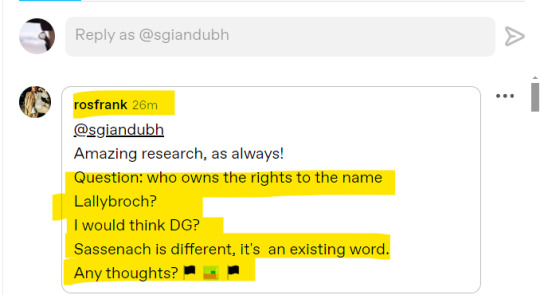
Whenever we are informally talking about 'owning the rights to something', I think it's very important to bear in mind a fundamental distinction between two different categories of ownership rights: copyright and trademark.
The copyright is the most familiar one to many of you. It is what you usually find on those annoying and apparently useless first or last pages of all the printed or digital editions on this planet. Something like this:

In the US, copyright issues are regulated by the Copyright Act of 1976, as included in Title 17 of the US Code. The US public authority competent for registering and managing copyright is, as predictable, the US Copyright Office.
Perhaps the most seminal US Supreme Court decision, as far as copyright is concerned, is the 1991 Feist Publications, Inc., v. Rural Telephone Service Co. In it, the Court ruled that mere compilations of information or facts (such as, for example, telephone books) are not protected by copyright, according to US law. In other words, the ancient legal concept of 'sweat of the brow' (which simply means the amount of work required to gather and compile those facts/information) is not enough to qualify a work for copyright protection, if no creative effort is added to enhance its content. This is why I have always considered absolutely ridiculous Marple's efforts to watermark public information screenshots: it is useless (to the extent that it legally protects her from nothing) and, as her timelines, a mere compilation of facts (legally ditto). A similar approach is preferred by the UK and also by many Roman law legal systems, such as the French one - just making things clearer, here, by the way.
See how 'Erself is roughly doing, right now, in this department:
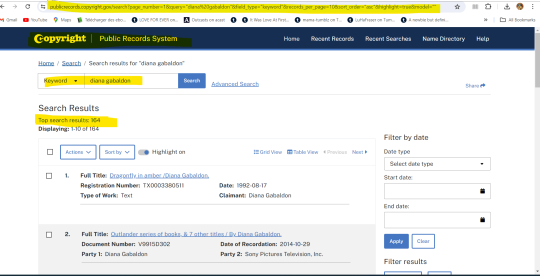
But I am rambling. In my view, Lallybroch, as a pivotal concept used in Diana Gabaldon's books, is protected by the copyright granted to each and every of her books mentioning it, according to the Roman law principle 'accessorium sequitur principale' (the accessory follows the principal). So it will remain protected for at least 70 years since the last of her books mentioning it would have been published under copyright. Unless she chooses to separately protect the entire finished cycle as a whole, once Book Ten (fingers crossed) is published, preferably during our foreseeable lifetimes.
That being said, that goes only for one copyright category: (published) text - you cannot copyright that secret diary in your drawer, LOL. This is why, the current US Copyright Office records concerning Lallybroch look like this:
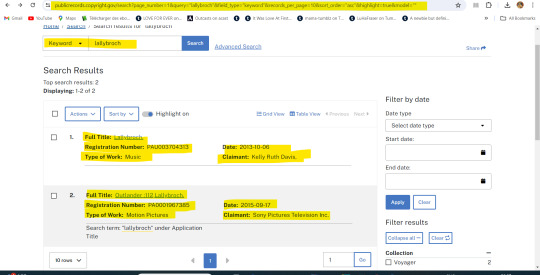
Sony Pictures Television Inc owns the copyright to the fictional name Lallybroch in the motion pictures category, as it is the title of the Episode 12, in Season 1 - DG has been handsomely compensated for this, no worries. And someone I have no idea about owns the rights to an original musical score she has written and titled Lallybroch in the music category, since October 2013.
Onwards to the trademark. This is something different and this is all about making your name/concept/idea profitable. It is all about branding it, putting it on a product and selling it under that brand. It includes all the graphic elements and the logo of the brand (accessorium...) - in short, its visual identity to the consumers. In the US, trademark issues are regulated by the 1946 Lanham Act and the public competent authority is the good old US Patent and Trade Office (USPTO).
Right now, the situation for the Lallybroch trademark is as follows:
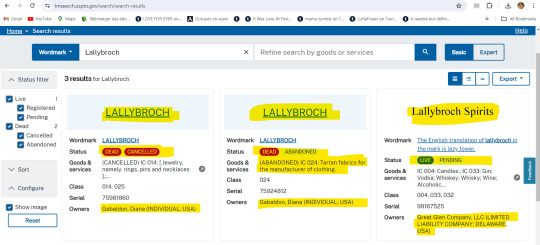
So, we see three different trademarks: two of them, owned by Diana Gabaldon, are classified as 'dead' (cancelled and/or abandoned) and the third, Lallybroch Spirits, owned by S's Great Glen Company is pending approval - he will not be able to label any booze bottle Lallybroch Drink Me before permission is granted by the USPTO.
Let's unpack:
Both Lallybroch trademarks formerly owned by Diana Gabaldon were filed at the USPTO on February 21, 2000 and granted on December 12, 2000. The first was aimed at producing 'tartan fabrics for the manufacturer of clothing' and it was abandoned in December 2003:

The reason is that the owner did not file in any Statement of Use after the trademark was granted. She had three years to do so, and since she chose not to do anything about it, the trademark was deemed abandoned (Stacy K. Smith is the attorney hired by Herself, btw). That means she specifically implied not to intend using it in the future. As such, she may claim NO rights on a now free to use mark:
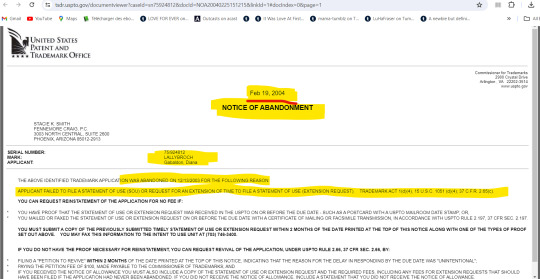
The second trademark was aimed at producing 'clothing, namely, t-shirts, dresses and headwear' and also 'jewelry, namely, rings, pins and necklaces'- to cut the story short: OL merchandise - and it was cancelled on March 1st, 2013:
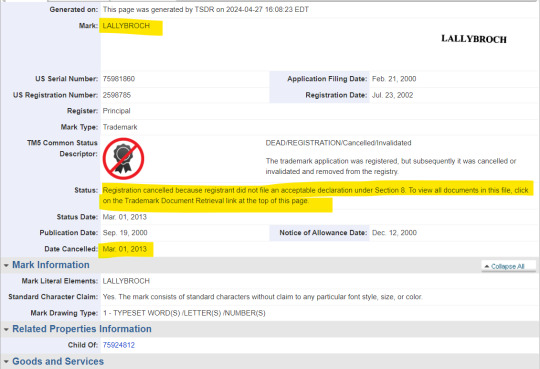
The reason is that the owner did not file the Section 8 declaration (of continuous use for five years) within the allowed legal timeframe (6 months after the fifth anniversary of the trademark granting renewal). Her trademark federal rights are now deemed canceled (but not her state law and/or common law rights!) and if she wants to ever use that name again, she would have to start the whole process over, bearing in mind the trademark could have been granted to someone else, in the meanwhile (not her case).
And for anyone who might ask, 'Erself does not own any other trademarks whatsoever:

The other (Doll Lab - LOL for ages) Diana Gabaldon is a pharmacist from Albuquerque, NM. Chill. 🤣🤣🤣
The owner of the copyright to the fictional toponym Lallybroch, as far as published text is concerned, is Diana Galabdon.
The owner of the copyright to the fictional toponym Lallybroch, as far as motion pictures are concerned, is Sony Pictures Television Inc.
The owner of the copyright to the fictional toponym Lallybroch, as a personal work of music, is Mrs. Kelly Ruth Davis, of Pennsylvania, USA.
The owner of the Lallybroch Spirits trademark will be Sam Roland Heughan, when that trademark is granted by the USPTO.
I hope this answers your question, @rosfrank. Thank you for asking.
110 notes
·
View notes
Note
Didnt Flynn himself and or some other Archie artists comment on the whole Shadamy as Silver's parents due to Silver being basically Trunks, and with Shadow being the Vegeta figure well, it just kinda makes sense no? Although honestly I see Rouge as more a Bulma that Amy is. Amy clearly fills Chi-Chi's role a lot more especially to Sonic's Goku. Then again, the comparison doesnt have to be perfect and its not like Sonic takes all the inspiration from Dragon Ball completely to heart.
Flynn and others have made several passing comments/jokes about Silver being a descendant of Shadow and Amy, yeah. However, Flynn himself has stated, as have said-other writers and artists, that whatever they say is not canon. It's just them having fun.
I kinda like that they can do that? Like, a person should be allowed to have fun with the material they work on, even if what THEY see and think isn't in the final product. Gotta go through quality control after all.
Sonic DOES take a lot of inspiration from DB, without question. Flynn himself did make the connection between Trunks and Silver. I can see both sides of the coin that you present with Amy, to be honest. She is a lot like Chi-Chi AND Bulma. Best of both worlds, I guess XD I don't believe this would directly correlate with Sonic's world though. As you said, 'the comparison doesn't have to be perfect, and its not like Sonic takes all the inspiration from Dragon Ball completely to heart.' Which like... is good. If it DID entirely lift and drop stuff from DB into its own plot, that might be grounds for plagiarism XD I do not know Japanese copyright law, however.
If this is in relation to the whole 'Is Silver Your Kid' question that was received here, I'll confess.... I wanted to leave the door open. I wanted to imply that it is possible, as Amy points out, that Silver MIGHT be their kid. She was casting about for reasons to doubt it until she conceded that the reason people probably think that is because of the relationship and parallels between Shadow and Silver... then low-key joked/blamed Shadow and their treatment of Silver as to WHY people think that. Then, Shadow flipped the script back on her.
Dunno if I got that across properly. I might not have, but that was the original goal.
I confess, too, that I had originally planned on going into physical similarities and differences as well as anatomy spiced up with some headcanons. Like- 'Don't just assume that Shadow and Silver are related because of chest fur. Most dudes have chest fur. Sonic doesn't because he doesn't want to take too much testosterone.' but I was worried I couldn't answer that in character in a logical way given the parameters of the question.
But yeah... *waves hand vaguely* that- wow I over answered this SO badly- that's the everything I guess XD XD XD XD
7 notes
·
View notes
Note
Hey, I just wanna say that, as a disabled person who at first vehemently disagreed with you, reading your pinned post really helped me understand your perspective and I can't, in good faith, say that I entirely disagree with you. AI art could be a very good creative resource for people, and I also disagree with a lot of art snobbery surrounding 'real Art' anyway. BUT if AI art programs were trained on datasets comprised of only the art of consenting artists, I don't think this would be as big of a debate. The only thing I have an issue with is you blaming the proliferation of data scraping on 'bad actors' when it feels like, at the moment, that 'bad actors' are intrinsically tied to what AI art is, and that those "bad actors" are controlling the entirety of neural network learning. Imo as of right now AI art is just data theft and if/when we reach the point where that isn't the case the conversation that you're trying to have can be expanded upon, but until then I don't see the majority of artists agreeing that copyright theft is a valid way to help the disabled community. And I personally disagree with stealing other people's art to further my own creative abilities.
First of all, thank you very much for being polite and presenting your thoughts in good faith.
I understand where you're coming from; the AI industry as a whole is deeply fraught with ethical issues. However, I don't think that art theft is one of them. You see, digital art only exists as abstract data. This means it could only be "owned" as intellectual property under copyright law. Intellectual property is purely a legal construct; it was invented for the purpose of incentivizing innovation, rather than to uphold the philosophical principles of ownership. I find that it makes very little sense that people should be able to own ideas—after all, it's seemingly human nature to adopt others' ideas into our own viewpoints, and to spread our ideas to others. In fact, there is an entire field of study, called memetics, dedicated to this phenomenon. So, I don't think that data scrapers are guilty of art theft. There is, however, an argument to be made that they are guilty of plagiarism. Scraped AI training databases generally do not credit the original authors of their contents, though they do disclose that the contents are scraped from the internet, so they aren't exactly being passed off as the curators' own work. Make of that what you will—I'm not really sure where I stand on the matter, other than that I find it questionable at best. Either way, though, I believe that training an AI makes transformative use of the training data. In other words, I don't think that training an AI can qualify as plagiarism, even though compiling its training dataset can. Rather than art theft or plagiarism, I think the biggest ethical problem with the AI industry's practices is their handling of data. As I mentioned in my pinned post, the low standard of accountability is putting the security of personal and sensitive information at risk.
Feel free to disagree with me on this. I acknowledge that my stances on IP certainly aren't universal, and I know that some people might not be as concerned about privacy as I am, but I hope my reasoning at least makes sense. One last thing: a lot of AI development is funded by investments and grants, so refusing to use AI may not be very impactful in terms of incentivizing better ethics, especially considering that ethics-indifferent businesses can be a fairly reliable source of revenue for them. That's why I think seeking regulation is the best course of action, but again, feel free to disagree. If you aren't comfortable with the idea of supporting the industry by using its products, that's perfectly valid.
7 notes
·
View notes
Text
The sad thing about AI to me is that it could be genuinely useful, but so many people are going over the top with it. So many companies are trying to make everything AI, even at the cost of stealing people's content (and often using the loophole of stealing non-copyrighted content). These companies are developing AI faster than the law can keep up with it, so we don't have enough regulation for it.
When I see "AI assistant" now from things like Google, it just leaves a bad taste in my mouth. The product in and of itself probably is helpful to have around, but anything called any form of "AI" outside of video game based AI (NPCs taking actions independent of your actions) just makes me... really uncomfortable.
It also sucks because if they just waited long enough, they might have had people volunteer or get jobs to help with AI training and language learning. They could've had real people manually input things to help AI learn instead of stealing existing content.
As a writer, sometimes I wish I could generate brief AI paragraphs, such as to help with ideas and inspiration (this being very impersonal, not using existing franchises/character names, etc, or the ones that let you just input character names and that's it), but now the thought of using AI just... makes me uncomfortable all around, because I have no idea if the AI prompt generators have also had stolen works fed to it. I don't know what generators might be legit and what had entire books or fanfictions fed to it. Anything I would want to generate for an idea now might generate based on stolen content, and I hate that.
AI could have been actually helpful and legit, but now it's a fucking mess and huge companies are using it in a way that both steals from creators and leaves people out of a job or potential job. Voice AI is all around just a massive fucking mistake to me, like throw that shit in the trash.
Now I don't know what AI out there exists on theft, and honestly, probably all of them do now. Even if the companies who backed them didn't intend for users to feed it existing content, the users will do that and the machine will learn those things regardless of that not necessarily being the company's intent. It's not necessarily always the company at fault, but the people using it and what they feed it. In some cases it's the companies as well, urging people to basically do this.
Now the concept of AI anything at all just makes me... so uncomfortable and it's ruined so many things and caused so much stress for people. If I see something AI powered I completely avoid it, even if it could be useful... and also because I never know when that shit is stealing my data or learning off anything I do that I didn't give explicit permission for.
7 notes
·
View notes